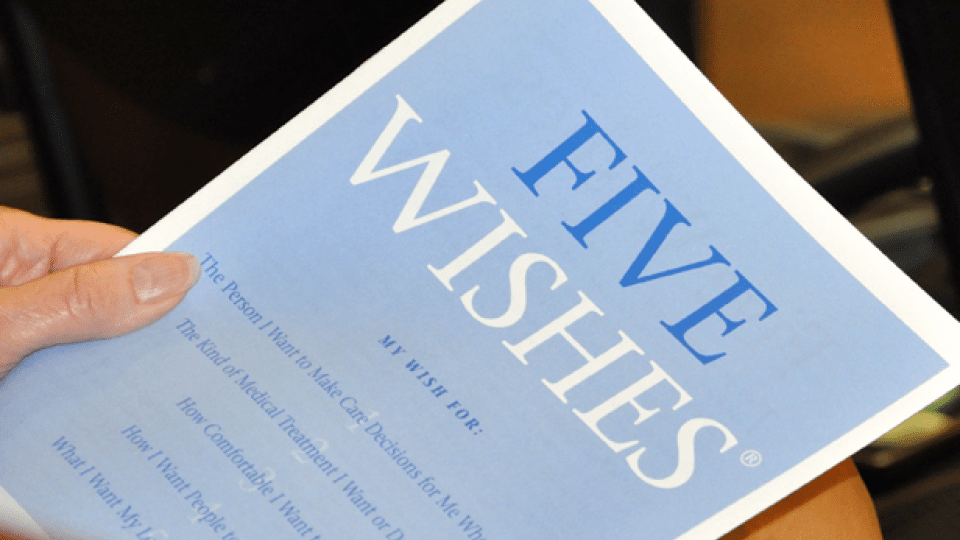It’s the nature of my job in hospice that many people I meet are in the middle of an urgent health crisis. Someone they love has reached a critical point, and now they have to figure out what happens next. Sometimes it’s an unexpected terminal diagnosis with a prognosis of weeks or months to live. Other times, it’s the result of a medical emergency, like a stroke or aneurysm. Or they’ve reached the final stage after living for many years with kidney disease, heart failure, dementia, cancer, or one of the many other ways our bodies fall apart as we age.
It can be hard to talk about someone we love reaching the end, no matter our age. I will always remember meeting a frail-looking man in his early 90s at the local hospital who had received a tough diagnosis and was considering all his options, including chemotherapy. His wife was sitting on a chair in the corner with tears in her eyes and did not want to hear what hospice care could offer. “I’m not ready to lose him yet,” she said. She wanted him to do whatever he needed to do to keep going. I could tell from our short conversation that he wasn’t sure what the right choice was for him to make. He wanted to talk with his son and get his thoughts too. I felt bad they were trying to decide what was next for him in a crisis.
Even after all the years of working in this field, I’m still surprised how many people haven’t taken the time to talk about or write down what’s important to them, and how they’d like to be cared for if they are facing a terminal diagnosis or end up on life support and can’t make their own decisions. I think it’s human nature not to want to think about dying and death, but at the same time it’s a heavy burden to hand over to someone you love to figure it out on your behalf, and often in a crisis, where making tough decisions is even harder to do. If you don’t know what they want, it can feel like giving up on someone you love if you don’t try every possible treatment to help them get better. The emotional side can outweigh the logical side, and we grasp for a tiny sliver of hope that one more round of chemo, another surgery or a few weeks in a rehab facility could turn things around. And sometimes our loved ones don’t want to disappoint us by saying what they truly want, that they’re done with all the treatments and they just want to go home and be with the people and animals they love for the time they have left.
I see a lot of guilt and fear in the families I meet, whether they are caring for a loved one at home or in a facility. They worry they have made the wrong choice or failed their loved one by not being able to provide the care they thought they could give: “I promised I would keep him at home until he died” or “I told her I’d never put her in a nursing home” or “I thought I could do this, but I’m in my eighties too and I just can’t lift him or get him to the bathroom.”
I have a friend who says, “Man plans, God laughs.” I get it. We can’t ever plan for every possible thing that might happen in our life, but putting down some general thoughts about what is important to you and how you’d like to be cared for if you can’t make your own decisions is an important thing you can do right now for your family and friends. They’ll know they are caring for you the way you would want them to do. That will lift the burden of guilt and worry about making the wrong decisions on your behalf. Booklets like Five Wishes (fivewishes.org) are simple and legal to fill out, and you can make copies to give to your medical providers and your family. Arizona also has the Healthcare Directives Registry (azhdr.org) with free resources and a centralized registry for all of your advance directives, so your healthcare provider can access them in a medical crisis or if you can’t speak for yourself.
A few weeks back, I got a phone call from a man who had heard one of my community talks. He asked if I might be willing to meet with him and his daughter, who was visiting from another state. He wanted to talk about what some of his options were for his care and his living situation as his health issues progressed. There was no imminent need, he said. It seemed like a good opportunity to have a frank conversation with his daughter, and he wanted to be sure he had all the facts. We met the next day in his apartment. His daughter was about my age. We talked about what this community offers as options to age in place, the different types of assisted living and what end-of-life care might look like for him. It was lovely to be a part of such a thoughtful discussion between father and daughter, both of them sharing what they considered important for his quality of life. I hope they write it all down, but even if they don’t, what a wonderful gift they gave each other by taking the time to have that conversation.

